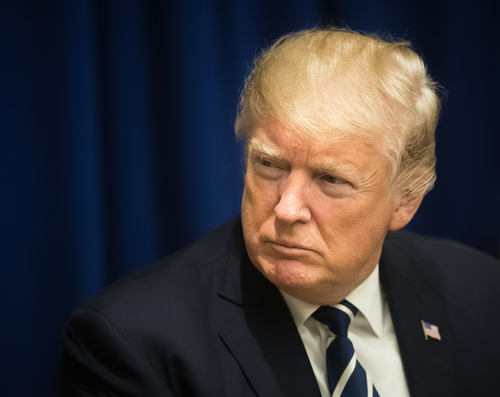Legal experts weigh in on Trump’s Cohen comments and whether they amount to witness intimidation

President Donald Trump/Shutterstock.com.
On Saturday, President Donald Trump told Fox News that rather than focusing on him regarding allegations of any wrongdoing, people should look at the father-in-law of Michael Cohen, Trump’s former lawyer who pleaded guilty in August to campaign-finance and financial abuses.
“He should give information maybe on his father-in-law because that’s the one that people want to look at. … That’s the money in the family. And I guess he didn’t want to talk about his father-in-law,” Trump told Judge Jeanine Pirro, the host of the Saturday evening program Justice with Judge Jeanine, in a phone interview. She asked Trump for the man’s name.
“I don’t know, but you’ll find out and you’ll look into it because nobody knows what’s going on over there,” Trump responded. According to an April 2018 CNBC article, Cohen’s father-in-law is Fima Shusterman, who reportedly loaned at least $20 million to a Chicago taxi mogul. Among the charges Cohen pleaded guilty to in August were failure to report income from a taxi medallion business.
Following Trump’s Fox News interview, Democratic leaders said Sunday that any effort to discourage or influence a witness’s testimony could be seen as a crime, the New York Times reports. If the Democrats attempt to build an impeachment case against Trump, according to the story, what he told Fox News could be considered witness intimidation and used against him as evidence.
“I have seen mobsters in mafia cases do this and gang leaders,” says Ronald S. Safer, former chief of the criminal division at the U.S. Attorney’s Office in Chicago. “But they wouldn’t tell the news; we’d pick it up in a wiretap. Nobody would come out and say these things—the gangsters know better.”
Now a partner at Riley Safer Holmes & Cancila in Chicago, where he does criminal defense work, Safer told the ABA Journal reasonable minds could differ on whether what Trump said amounts to witness intimidation. He adds that he would fire a client who did something similar.
“It seems to me that the president walked right up to the line, if not across it,” he says.
Kenneth P. White, a former assistant U.S. attorney, also tells the ABA Journal that he would fire a client who did something like Trump did during the Saturday interview. However, White thinks if Trump winds up facing criminal charges or an impeachment trial, he might have a plausible defense because obstruction offenses require specific intent.
“Bizarrely, as in many facets of Trump’s behavior, the worse he acts, the higher the bar gets,” says White, a white-collar defense lawyer and a partner at Brown White & Osborn in Los Angeles. He also co-hosts the KCRW program All the President’s Lawyers, a weekly radio show that looks legal drama involving Trump and his attorneys.
According to White, a defense can be made on the basis of having a bad filter.
“You could say ‘This is someone who says whatever comes out of his mouth and doesn’t intend it the way normal humans would,’ ” White says when asked about defending a client with a bad filter. He mentions a lawsuit brought against Trump by Cheri Jacobus, a political consultant who sued Trump for defamation, following a February 2016 tweet in which he wrote that she “begged us for a job. We said no and she went hostile. A real dummy!”
A New York appeals court dismissed the lawsuit in late 2017, according to the Hollywood Reporter, on the basis that the statements were too vague to be actionable, and the context in which they “were made would signal to the reasonable reader or listener that they were opinion and not fact.”
“The court’s response was that everyone understands the president bloviates on Twitter, and we’re not inclined to take him seriously,” says White, who thinks statements such as what Trump said about Cohen could be good publicity with his base but also could be seen as criminal actions and are definitely outside the norm.
“It’s appalling, legally,” White says. “Everyone in legitimate law enforcement or the criminal defense community cringes.”



